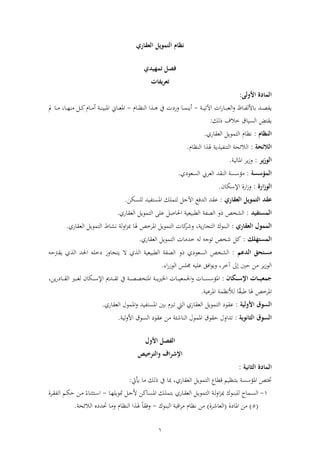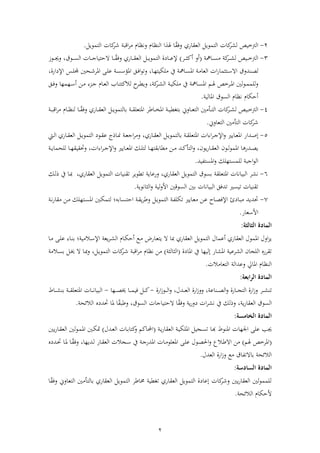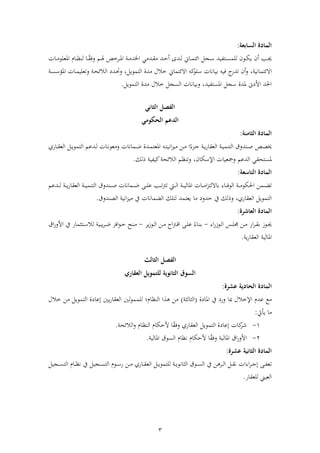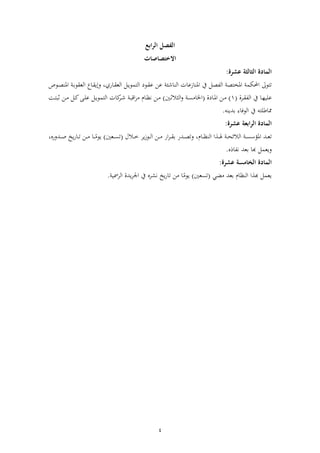نظام التمويل العقارى السعودى
- 1. 1 نظامالتمويلالعقاري تمهيدي فصل يفاترتع المادة:األولى أل دفدد داأللفاظددصيقالألاآ دفددباظعوتددديأل-أللأل دفألوددمأينيفألدفمدد دااألاظنددىأل-ألدفلألاملددعاملدفدد ن أل دددادفمألدد ألأ دددنبيأل دفألدد ،أل :يقتضألاظسيفقألخالفألذظكأل النظام:ألفم نأل.ي ألاظعقف اظتمويأل الالئحة:ألاظالئحأل.فم ألهلااألاظن ياي اظتنأل يرزالو:أليرزوأل. املفظيأل المؤسسةأل:ألؤسسأل.ي اظنقاألاظعريبألاظسعوأل ارةزالو:ألةألا ازو.إلسكفنأل عقدالتمويلالعقاري.ياألظلسكن ألظتملكألاملست :ألعقاألاظافعألاآجأل المستفيد:ألاظشخصأل.ي ألاظعقف ألعلىألاظتموي ألاحلفص ألاظطبيعي ذوألاظصأل الممولالعقاريي :ألاظبنوكألاظتجف،ألأل ألنشفطألاظتموي ظوازألاملرخصألهلفألمب افلألاظتمويوشري اظعقف.أل المستهلك:ألاأل.ي ألاظعقف فلألاظتموي شخصألتوجوألظوألخاأل مستحقالدعمألألي ألاظسعوألاظشخص:ذوألأليقرتحوألألاظايألاحلاخلو ألأليتجفوزألالألاظاي ألاظطبيعي اظص نألحنيألإىلألآخر يرألزاظو،ألافقوويأل.اءعليوألجملسألاظوزأل ااتااايجمعان ااااساإلألين،أل دفدددقدصألاظددد دكفنألظدددسدانألاإلدددقأليفألت ددددصألاملتخص دددديصدفلألاخدددياامعودفلألدددس:ألاملؤس املرخصأل. ألاملرعي م فألظألنًقهلفألطبأل السوقاألولية.ي املمولألاظعقفوياأل يألاظيتألتربمأللنيألاملست ألاظعقف ألاظتموي :ألعقوأل السوقالثانوية:ألتااولألحقوقألاملمولأل. ظيوألاظسوقألاا نألعقو أل اظنفشئ الفصلاألول والترخيص افراإلش المادةالثانية: ختتصألي،ألمبفأل ألاظعقف يمألقطفعألاظتموي أللتن املؤسسيفأل:فأليأيت ذظكألأل 1-أل دمفساظدوكنظلبألدفأل ألدتويل ددجدفانألاسدكألاملدليأللتم دفقألاظع ديألاظتمو ددظوازمب-ألدمألكدنألحد ألًدتننفءسادرةدق اظأل (5ألاظبنوكأل اقبر فمأل نألن ةأل(اظعفشرة)أل نألاملف )أل-ألألهلااألاظنًفوفقفمألف وأل. هألاظالئح حتاأل
- 2. 2 2-اظرتخيصألافلظشرألألًقيألوف ألاظعقف اظتموي. افلألاظتمويألشر اقبر فمأل فمألون فألهلااألاظنأل 3-ديصألددخاظرتادردددشظألأل دفدددس(دردددنأوألأا)أليأل دفدددقألاظع ددديةألاظتمو دفدددعإلدفدددًقوفألدوزألددد دوق،ألودددسدفلألاظدددجالحتيف دناوقصظألدفد لكيت أليفأل دفدسألامل د الألاظعف دتنمفدساال،ألدحنيألدشدىألاملرلألع ددسدقألاملؤسفاووتدسدلجملألة ا اإل،أل دمألدهلدرخصألدملظنيألاوددمظلمودفدساملألأل دفدتألظالات دردط،ألوي ادردشألاظ دديلك يفألدفمدعاظألدقألدففألو م ددسدنألأد دزءألدج . فمألاظسوقألاملفظي أحكفمألنأل 4-ديصألددخاظرتافلدرددشظألدددًقيألوف دفددقألاظع ددديأللفظتمو دددقدفطرألاملتعلددخألامل ددديط دفولأللتددعنيألاظت دأددتاظدفمألدد فألظندددباقرأل افلألاظشر.نيألاظتعفول تأأل 5-أل داادصإدفيصدعاملألي دفدقألاظع دديأللفظتمو ددقاءالألاملتعلرددجاإلو،ألأل دديألاظتمو دودقدفذوألعدذأل ددعاجر وي دفدقاظعألديتألدظا دفيصألدعدكألاملدلدفألظتد طفلقت دنألد داألدااظتأويون،أل دفدقدونألاظعدظوىفألاملم دادصي،اءالرددجاإلوألأل دديدفألظلحمفد وحتقيق .يا املستولكأل ألظلمست اجبواظأل 6-أللسوقألاظ نشرألاظبيفنفلألاملتعلقأل تمويي اظعقف،ألي،ألأل ألاظعقف ألتطويرألتقنيفلألاظتموي عفيودفمبألدكألظيفألذ . اظنفنويوأل تقنيفلألتيسصألتافقألاظبيفنفلأللنيألاظسوقنيألااوظيأل 7-أل دن قف دنأل لكأل دتسدنيألاملكدفلواألظتمسألاحت دقيرألوط ديألاظتمو د دفيصألتكلع دنألعأل دفصألاإلف دفب حتاياأل . ااسعفأل المادة:الثالثة يأل اولألاملمولألاظعقفزيي دالسألاإل يعردشدفمألاظكدعألأح أل دفعيألمبفألالأليت ألاظعقف أعمفلألاظتموياألدفأل دىأللدفءألعنل أل دالسألل دبدفألالألمبو،أل ديافلألاظتمودرشأل اقبر فمأل نألن )أل ةأل(اظنفظن فأليفألاملف ألإظي ألاملشف هألاظلجفنألاظشرعيتقر الل ألاظتعف فمألاملفيلألوعااظ اظن.أل المادةالرابعة: دردددشتنألدنفعدددصاظوةأل دفدددجةألاظت ازو،ألدالدددعةألاظ ازوو،ألةأل ازدودددظاو-ألألددددصدفألبدددمألفي ددددافأل-ألدفلدددناظبيفألدفطألدددشأللن ددددقاملتعل ي اظسوقألاظعقف،ألوذظكأليفألألًقألوف يو الألرنشفألفألًقالحتيفجفلألاظسوق،ألوطبهأل ملفألحتااظالئح.أل المادةالخامس:ة بألعلىألأل دي ألاظعقف ديألامللك دجيسدفألتهبفلألاملنوطأل اا(دفامألحملادفللاتفوألدالعاظ)ألينيأل دفقظنيألاظعودمدنيألاملكدت (املرخصألهلم)ألدىأللدولألعصاحلودالعألطنألاالدفل املعلوألدايظأل دفقدجاللألاظعسأليفأل دج املاف،ألدًقوفهأل داحتدفألملفأل عأل فقأل أللفالت اظالئحة ازوأل.اظعالأل المادةالسادسة: نيأل يأللفظتأ ألاظعقف ألخمفطرألاظتموي طي يألت ألاظعقف ةألاظتموي افلألإعفينيألوشر ظنيألاظعقفوظلممفألًقاظتعفولألوف . احكفمألاظالئحأل
- 3. 3 :السابعة المادة دبدألأل دد ألاخا دادق داألدحدايألأدظدفلألدمألائت دجدسياأل دتدسدونألظلمدكأنأليدرخصدملاألدمدهلألدفلألد دفمألاملعلود دفألظندًقوف ، االئتمفنيألاوألوألفيوألليفنفلألسلوأنألتاواالئتمفلألاةألاظتموي خاللأل،ألأل دسدفلألاملؤسمألوتعلي دحألاظالئ داحتو أل ىنألملاةألسج احلاألاايا املست،أل. اةألاظتموي ألخاللأل وليفنفلألاظسجأل الفصلالثاني الدعمومي الح المادة:الثامنة دصدصبألألًدزءدجأل ددي ألاظعقف دديدناوقألاظتنمدصداةألدمدوألاملعتدتانيزي دنألد األدمفنفلدضأليأل دفدقألاظع دديداعمألاظتمودظدفلألدنعو و ألاظاعمألومجعيفلألاإلسكفن ملستحق،ألمأل وتناظالئحألأل.ألذظك ي ايأل المادة:التاسعة دمنددضتألدىألددلدبألعدددترتديتألتددظألا ددديدفلألاملفظددد ازدفءأللفالظتددفألاظو ددد احلكودمفنفلددضألداعمألدددظأل دددي ألاظعقف ددديدناوقألاظتنمدددص فأليعتماألظتلكأل أل ي،ألوذظكأليفألحاو ألاظعقف اظتموياظضمفنفلألانيزي يفألأل.اظصناوقأل المادة:العاشرة دوزدألاءألدوزدظدسألادلدنألجمد أل ارددقل-أليرألزدودظدنألاد أل ارتددقدىألادلألعًدفءدنل-ألدندألافزوددحأليبيرددضألدتندسظالاقألأليفألااو مف . ي ألاظعقف املفظيأل الفصلالثالث السوقللتمويل الثانويةالعقاري المادة:عشرة الحادية عألةأل أليفألاملف عامألاإلخاللألمبفألو(اظنفظن)ألفماأل نألىااألاظنظنيوظلممألنألخاللأل أل ةألاظتموي ينيألإعف اظعقف :فأليأيتأل 1-افلألشرة إعفألألًقيألوف ألاظعقف اظتمويفمأل فألاحكفمألاظن. اظالئحوأل 2-اقألااواملفظيألألًقوف. فمألاظسوقألاملفظي فألاحكفمألنأل المادة:عشرة الثانية دىد تعأليأل دفدقألاظع ددديألظلتمو دديدوقألاظنفنوددسدرىنأليفألاظددظألا ددقاءالألنردددجإدنددألأل دجيددسدفمألاظتدد أليفألن دجيدسدومألاظتددس . اظعيينألظلعقفأل
- 4. 4 الفصلالرابع االختصاصات المادة:عشرة الثالثة تألاملختص توىلألاحملكمألأليفأل ص اظاملنفزعفلألأل اظنفشئعي دفقألاظع ديألاظتمو دوقنألعأل،ألوأل دوصألاملن دلدفعألاظعقوقإي ع(درةألدق دفأليفألاظ لي1ددتدنألنبد أل دادىألدلألع ديافلألاظتمودردشأل ددباقر دفمأل دنألند دني)ألناظنالوأل ددس ةأل(اخف دفدملدنألا )ألتأل .ممفطلتوأليفألاظوففءأللاينوأل المادة:عشرة الرابعة داددعتألدفمدد دااألاظنددهلأل دددحألاظالئ دددساملؤس،ألأل داددصوتيرزدوددظدنألادد أل اردددقلألداللألددخ(دعنيددست)ألدددًيوفألأل ي دفددتدنألدده،ألداوددص ألهبفأل ويعملعاألفذه ن.أل المادة:عشرة الخامسة أل ض فمأللعاأل ألهبااألاظن يعم(تسعني)أل. ياةألاظرمسيرألنشرهأليفألاا ي نألتف فألًيوأل




